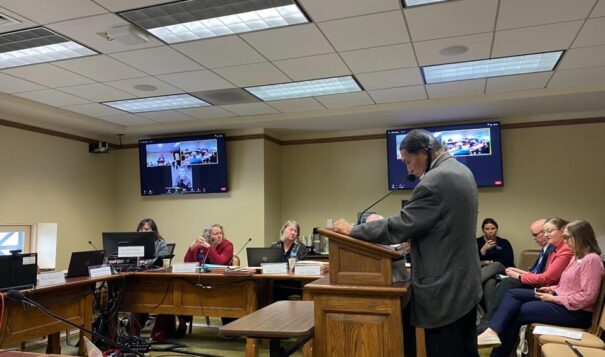News Based on facts, either observed and verified directly by the reporter, or reported and verified from knowledgeable sources.
Montana’s Indian Education curriculum requirement amended, moves forward
 Montana Rep. Jonathan Windy Boy, Democrat, speaks to the Senate Education and Cultural Resources committee on March 31 discussing his Indian Education for All bill. (Photo courtesy Lance FourStar, Montana American Indian Caucus director)
Montana Rep. Jonathan Windy Boy, Democrat, speaks to the Senate Education and Cultural Resources committee on March 31 discussing his Indian Education for All bill. (Photo courtesy Lance FourStar, Montana American Indian Caucus director)
The bill, which is also at the center of a lawsuit, is a state constitutional requirement
A legislative bill that would revise the laws surrounding Montana’s Indian Education For All curriculum public school requirement is slowly making its way through the Legislature, even if some recent amendments have the bill’s sponsor cautious.
The Senate floor voted to pass the amended Indian education bill, out to the Senate floor this week with a vote 47-3. The amendment includes reducing the tribal history curriculum from a public school requirement to a recommendation that is “encouraged.”
The bill’s sponsor said he planned to call for a conference committee when the bill hits the House floor again. He said he planned to refuse to concur with the amendment, giving him time to rework the wording.
In the meantime, he said he had to bide his time in order to allow the bill to move through the process.
“I said, ‘Whatever you need to do to get the votes on that, get it the hell out of there, then do what you gotta do,’ because I’m going to ‘do-not-concur’ anyway,’” said Rep. Jonathan Windy Boy, Democrat, in an interview with Montana Free Press and ICT.
Windy Boy introduced the bill after several claims of inadequate curriculum implementation and a lawsuit against the Montana Office of Public Instruction have come to surface in the state.
Several Montana tribes filed a lawsuit in 2021 against the Office of Public Instruction and the Board of Public Education due to insufficient Indian education implementation across the state’s school districts.
Windy Boy’s bill would require a stronger reporting system for state public school districts in order to show the state that Indian Education for All is being taught to standards. If schools don’t report back, then they will be subject to losing future program funding.
“If you receive one Indian Ed for All dollar, then you’re going to have to report what you’re doing,” said Windy Boy during the Senate Education and Cultural Resources committee hearing. “If you’re not doing what the court case says that you’re going to do as far as implementation of Indian Ed. for All then we are going to hold your money back.”
The amended version of the Indian Education bill, requested by Sen. Shannon O’Brien, Democrat, changed language in the title from requiring the Office of Public Education and the Board of Public Education to implement Montana’s constitutional mandate of Indian education.
Instead, according to the amendment, the requirement, despite being outlined in the state’s constitution, would be considered an encouragement.
“The reason that I proposed the amendment was because I wanted to, number one, ensure that the bill would pass out with the committee,” said O’Brien in an interview with Montana Free Press and ICT. “I had reason to believe that it was not going to pass out of committee without the amendment, and it worked.”
The IEFA bill did in fact pass out of the Senate committee unanimously with a vote of 11-0 on April 5. Now the bill is headed back to the House floor to be deliberated again with the amendment.
The American Civil Liberties Union of Montana and the Native American Resource Fund brought forward the lawsuit in 2021 on behalf of several Montana Individuals alongside six Montana tribes. Last week a Montana district court denied the OPI and BPEs’ motion to dismiss the lawsuit, and the trial is expected to begin next year in August.
This story is co-published by Montana Free Press and ICT, a news partnership that covers the Montana American Indian Caucus during the state’s 2023 legislative session. Funding is provided in part by the Headwaters Foundation.
